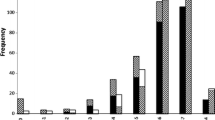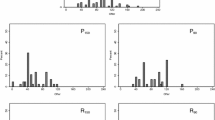Abstract
Previous ultimatum bargaining experiments have shown that bargainers face the conflict whether to exploit bargaining power or to comply with basic norms of distributive justice. In multiperiod ultimatum bargaining for an increasing cake, trust in fairness can enable cooperation and thus more efficient results but is also open to opportunistic exploitation. In such a game the two players take turns in being the one who suggests an agreement and decides whether this is the final proposal, whereas his partner can only accept this proposal or reject it. While the game theoretic solution implies an immediate agreement assigning nearly all the cake to the demanding player, efficiency requires to postpone the agreement to the last possible round. Our 2 × 2-factorial design varies the number of possible bargaining periods and the cake increase, allowing us to explore several hypotheses.
Similar content being viewed by others
References
Axelrod R (1981): The emergence of cooperation among egoists. American Political Science Review 75, 306–318.
Binmore Ken G, Shaked Avner, and Sutton John (1985): Testing Noncooperative Bargaining Theory: A Preliminary Study. American Economic Review 75, 1178–1180.
Brandstätter H (1988): Sechzehn Persönlichkeits-Adjektivskalen (16PA) als Forschungsinstrument anstelle des 16PF. Zeitschrift für experimentelle und angewandte Psychologie 35, 370–391.
Coase RH (1960): The problem of Social Cost. Journal of Law and Economics 3, 1–44.
Güth Werner, Schmittberger Rolf, and Schwarze Bernd (1982): An Experimental Analysis of Ultimatum Bargaining. Journal of Economic Behavior and Organization 3, 367–388.
Güth Werner and Tietz Reinhard (1988): Ultimatum Bargaining for a Shrinking Cake — An Experimental Analysis, in: Tietz R/Albers W/Selten R (eds.): Bounded Rational Behavior in Experimental Games and Markets. Lecture Notes in Economics and Mathematical Systems, Vol. 314, Berlin-Heidelberg-New York-Tokyo, 111–128.
Güth Werner and Tietz Reinhard (1990): Ultimatum Bargaining Behavior — A Survey and Comparison of Experimental Results. Journal of Economic Psychology 11, 417–449.
Güth Werner and Yaari Menahem (1991): Explaining Reciprocal Behavior in Simple Strategic Games: An Evolutionary Approach, in: Explaining Process and Change: Approaches to Evolutionary Economics (ed. U. Witt). Michigan University Press.
Harrison GW, Hoffmann E, Rutström EE, and Spitzer ML (1987): Coasian Solutions to the Externality Problem in Experimental Markets. The Economic Journal 97, 388–402.
Harrison GW, McCabe KA (1991): Testing Non-Cooperative Bargaining Theory in Experiments. Working Paper B-91-03, College of Business Administration, University of South Carolina.
Harrison GW and McKee M (1985): Experimental evaluation of the Coase theorem. Journal of Law and Economics 28, 653–670.
Hoffmann E and Spitzer ML (1982): The Coase Theorem: Some Experimental Tests. Journal of Law and Economics 25, 73–98.
Kirchsteiger Georg (1991): The Role of Envy in Ultimatum Games. Working Paper. Vienna, Austria: Institute for Advanced Studies, Department of Economics.
McKelvey Richard D and Palfrey Thomas (1992): An Experimental Study of the Centipede Game. Econometrica 60, 803–836.
Neelin J, Sonnenschein H, and Spiegel M (1988): A Further Test of Noncooperative Bargaining Theory: Comment. American Economic Review 78, 824–836.
Ochs J and Roth Alvin E (1989): An Experimental Study of Sequential Bargaining. American Economic Review 79, 355–384.
Oppewal Harmen and Tougareva Elena (1991): Three-Person and Four-Person Ultimatum Bargaining Games. Lecture at the Joint 1991 Annual Conference of IAREP and SASE (International Conference on Interdisciplinary Approaches to the Study of Economic Problems), Stockholm, Sweden, June 16–19, 1991.
Prasnikar Vesna and Roth Alvin E (1990): Perceptions of Fairness and Considerations of Strategy: Some Experimental Data. Working Paper, University of Pittsburgh.
Pruitt DG (1967): Reward Structure and Cooperation: The Decomposed Prisoners' Dilemma Game. Journal of Personality and Social Psychology 7, 21–27.
Pruitt DG (1970): Motivational Processes in the Decomposed Prisoners' Dilemma Game. Journal of Personality and Social Psychology 14, 227–238.
Selten Reinhard (1965): Spieltheoretische Behandlung eines Oligopolmodells mit Nachfrageträgheit — Teil I: Bestimmung des dynamischen Preisgleichgewichts. Zeitschrift für die gesamte Staatswissenschaft 121, 667–689.
Selten Reinhard (1975): Reexamination of the Perfectness Concept for Equilibrium Points in Extensive Games. International Journal of Game Theory, Vol. 4, Issue 1, 25–55.
Selten Reinhard (1979): Experimentelle Wirtschaftsforschung, in: Rheinisch-Westfälische Akademie der Wissenschaften, Vorträge N 287, 41–60.
Selten Reinhard and Stöcker Rolf (1986): End Behavior in Finite Prisoners' Dilemma Supergames. Journal of Economic Behavior and Organization 7, 47–70.
Shogren Jason F (1989): Fairness in Bargaining Requires a Context — An Experimental Examination of Loyalty. Economics Letters 31, 319–323.
Shogren Jason F (1990): An Experiment on Coasian Bargaining over Ex Ante Lotteries and Ex Post Rewards. CARD-Working Paper 90-WP63, Iowa State University.
Smale S (1980): The prisoners' dilemma and dynamical systems associated to non-cooperative games. Econometrica 48, 1617–1634.
Stocker Rolf (1978): Altruism and Performance in Bertrand-Duopoly-Experiments. Contributions to Experimental Economics, Vol. 7: Bargaining Behavior. Tübingen, 41–59.
Stöcker Rolf (1980): Experimentelle Untersuchung des Entscheidungsverhaltens im Bertrand-Oligopol. Pfeffer, Bielefeld.
Author information
Authors and Affiliations
Additional information
We gratefully acknowledge helpful comments by the editor and four anonymous referees.
Rights and permissions
About this article
Cite this article
Güth, W., Ockenfels, P. & Wendel, M. Efficiency by trust in fairness? multiperiod ultimatum bargaining experiments with an increasing cake. Int J Game Theory 22, 51–73 (1993). https://doi.org/10.1007/BF01245570
Received:
Revised:
Issue Date:
DOI: https://doi.org/10.1007/BF01245570




